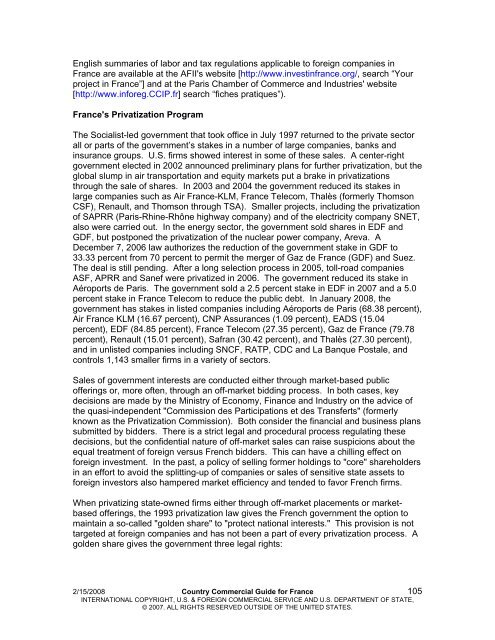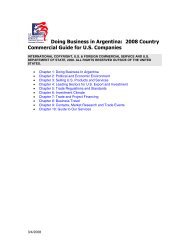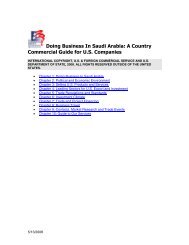Doing Business In (Insert Country Name Here) - BNA
Doing Business In (Insert Country Name Here) - BNA
Doing Business In (Insert Country Name Here) - BNA
Create successful ePaper yourself
Turn your PDF publications into a flip-book with our unique Google optimized e-Paper software.
English summaries of labor and tax regulations applicable to foreign companies in<br />
France are available at the AFII's website [http://www.investinfrance.org/, search “Your<br />
project in France”] and at the Paris Chamber of Commerce and <strong>In</strong>dustries' website<br />
[http://www.inforeg.CCIP.fr] search “fiches pratiques”).<br />
France's Privatization Program<br />
The Socialist-led government that took office in July 1997 returned to the private sector<br />
all or parts of the government’s stakes in a number of large companies, banks and<br />
insurance groups. U.S. firms showed interest in some of these sales. A center-right<br />
government elected in 2002 announced preliminary plans for further privatization, but the<br />
global slump in air transportation and equity markets put a brake in privatizations<br />
through the sale of shares. <strong>In</strong> 2003 and 2004 the government reduced its stakes in<br />
large companies such as Air France-KLM, France Telecom, Thalès (formerly Thomson<br />
CSF), Renault, and Thomson through TSA). Smaller projects, including the privatization<br />
of SAPRR (Paris-Rhine-Rhône highway company) and of the electricity company SNET,<br />
also were carried out. <strong>In</strong> the energy sector, the government sold shares in EDF and<br />
GDF, but postponed the privatization of the nuclear power company, Areva. A<br />
December 7, 2006 law authorizes the reduction of the government stake in GDF to<br />
33.33 percent from 70 percent to permit the merger of Gaz de France (GDF) and Suez.<br />
The deal is still pending. After a long selection process in 2005, toll-road companies<br />
ASF, APRR and Sanef were privatized in 2006. The government reduced its stake in<br />
Aéroports de Paris. The government sold a 2.5 percent stake in EDF in 2007 and a 5.0<br />
percent stake in France Telecom to reduce the public debt. <strong>In</strong> January 2008, the<br />
government has stakes in listed companies including Aéroports de Paris (68.38 percent),<br />
Air France KLM (16.67 percent), CNP Assurances (1.09 percent), EADS (15.04<br />
percent), EDF (84.85 percent), France Telecom (27.35 percent), Gaz de France (79.78<br />
percent), Renault (15.01 percent), Safran (30.42 percent), and Thalès (27.30 percent),<br />
and in unlisted companies including SNCF, RATP, CDC and La Banque Postale, and<br />
controls 1,143 smaller firms in a variety of sectors.<br />
Sales of government interests are conducted either through market-based public<br />
offerings or, more often, through an off-market bidding process. <strong>In</strong> both cases, key<br />
decisions are made by the Ministry of Economy, Finance and <strong>In</strong>dustry on the advice of<br />
the quasi-independent "Commission des Participations et des Transferts" (formerly<br />
known as the Privatization Commission). Both consider the financial and business plans<br />
submitted by bidders. There is a strict legal and procedural process regulating these<br />
decisions, but the confidential nature of off-market sales can raise suspicions about the<br />
equal treatment of foreign versus French bidders. This can have a chilling effect on<br />
foreign investment. <strong>In</strong> the past, a policy of selling former holdings to "core" shareholders<br />
in an effort to avoid the splitting-up of companies or sales of sensitive state assets to<br />
foreign investors also hampered market efficiency and tended to favor French firms.<br />
When privatizing state-owned firms either through off-market placements or marketbased<br />
offerings, the 1993 privatization law gives the French government the option to<br />
maintain a so-called "golden share" to "protect national interests." This provision is not<br />
targeted at foreign companies and has not been a part of every privatization process. A<br />
golden share gives the government three legal rights:<br />
2/15/2008 <strong>Country</strong> Commercial Guide for France 105<br />
INTERNATIONAL COPYRIGHT, U.S. & FOREIGN COMMERCIAL SERVICE AND U.S. DEPARTMENT OF STATE,<br />
© 2007. ALL RIGHTS RESERVED OUTSIDE OF THE UNITED STATES.












